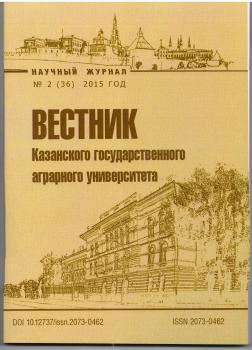Russian Federation
Emerging on a regular basis, crisis phenomena in the economy often change the parameters of economic entities functioning in it, forcing them to adapt to the causes of the crises that form them, or to cease their activities through the mechanism of bankruptcy. In conditions of dynamic external environment, the adaptation to the conditions of the current crisis is impossible without complex changes in various enterprise management systems, including innovative ones, on the effectiveness of the functioning of which depends the efficiency of the enterprise development in the future. The research on the effectiveness of innovation management systems is exemplified by the enterprises of the agro-industrial complex in the Republic of Tatarstan in 2010 - 2016, with an emphasis on the latter period. The following methods were used for the research: descriptive (descriptive), logical, analytical, graphical and group peer review method. As a result of the study, the following conclusions were obtained: a tendency of reduce the effectiveness of innovation management at enterprises of the agro-industrial complex of the Republic of Tatarstan from 2013 to 2016 was revealed; the evidence of the fact of low efficiency of innovation management at enterprises of the agro-industrial complex of the Republic of Tatarstan in 2016 is reasoned; ranking of the list of the most probable reasons for the low level of innovation management efficiency was carried out. In the resultant part of the study, in order to adjust the methodological basis for innovation management at enterprises of the agro-industrial complex in the Republic of Tatarstan, it was proposed: to identify crises, that adversely affect these enterprises and rank them according to the level of significance of such impact; to study in detail the existing methodological base for managing innovations in terms of the relevance of its application in the context of the impact of identified crises; to adjust the methodological base for managing innovations to ensure the relevance of its application in the context of the impact of identified crises.
efficiency, management, innovation, enterprise, agro-industrial complex, crisis, indicators, problem, adaptation.
В условиях мирового экономического кризиса, вызвавшего глобальное ухудшение финансового состояния хозяйствующих субъектов, особую актуальность приобретают вопросы рационального использования их ресурсов, требующие значительного сокращения (оптимизации) затрат [1, с.42].
По данным рейтингового агентства «Эксперт РА», в 2016 году в Российской Федерации вопросы сокращения (оптимизации) затрат были в значительной степени актуальны для хозяйствующих субъектов, принадлежащих к следующим разделам видов экономической деятельности (усредненные данные по всем регионам Российской Федерации) [10]:
- раздел A. Сельское, лесное хозяйство, охота, рыболовство и рыбоводство (рейтинг необходимости 9,27% из 100%);
- раздел B. Добыча полезных ископаемых (рейтинг необходимости 4,59% из 100%);
- раздел C. Обрабатывающие производства (рейтинг необходимости 6,33% из 100%);
- раздел D. Обеспечение электрической энергией, газом и паром; кондиционирование воздуха (рейтинг необходимости 5,27% из 100%);
- раздел E. Водоснабжение; водоотведение, организация сбора и утилизации отходов, деятельность по ликвидации загрязнений (рейтинг необходимости 6,55% из 100%);
- раздел F. Строительство (рейтинг необходимости 7,85% из 100%);
- раздел G. Торговля оптовая и розничная; ремонт автотранспортных средств и мотоциклов (рейтинг необходимости 8,56% из 100%);
- раздел H. Транспортировка и хранение (рейтинг необходимости 6,56% из 100%) и т.д.
Из приведенного перечня можно увидеть, что за исследуемый период времени в Российской Федерации сокращения (оптимизации) затрат были актуальны, в первую очередь, для предприятий агропромышленного комплекса, представленных в разделе «А» видов экономической деятельности.
По уточненным, данным для Республики Татарстан за 2016 год значение рейтинга необходимости сокращения затрат для предприятий агропромышленного комплекса составило 10,15%, что, учитывая общее количество разделов видов экономической деятельности в количестве 21, является достаточно существенным.
1. Karimov T. R. To the issue of managing the innovative activity stimulation in the oil refining industry of Russia. [K voprosu upravleniya stimulirovaniem innovatsionnoy deyatelnosti v neftepererabatyvayushchey otrasli Rossii]. // Aktualnye problemy ekonomiki i prava. - Actual problems of economics and law. - 2012. - 2 (22). - P. 40-48.
2. Karimov T. R. Management of innovative activity stimulation of oil refineries on the basis of Business Unit Management. [Upravlenie stimulirovaniem innovatsionnoy deyatelnosti neftepererabatyvayuschikh predpriyatiy na osnove Business Unit Management]. / T. R. Karimov, M. D. Fayzrakhmanov // Vestnik Kazanskogo gosudarstvennogo agrarnogo universiteta. - The Herald of Kazan State Agrarian University. - 2011. - 1 (19). - P. 73-76.
3. Krasochenkova N. P. Management of innovations in the terms of international integration. [Upravlenie innovatsiyami v usloviyakh mezhdunarodnoy integratsii]. / N. P. Krasochenkova // Voprosy ekonomik i prava. - Questions of Economics and Law. - 2014. - 9. - P. 42-45.
4. Pimenov S. V., Panova S. A., Osipov M. A. Innovation management as a business process. [Upravlenie innovatsiyami kak biznes-protsess]. / S. V. Pimenov, S. A. Panova, M. A. Osipov // Ekonomicheskie nauki. - Economic sciences. - 2010. - 2. - P. 152 - 158.
5. Fayzrakhmanov D. I., Khazeev L. F. Risks, associated with innovations and investments in the agro-industrial complex. [Riski, svyazannye s innovatsiyami i investitsiyami v agropromyshlennom komplekse]. / D. I. Fayzrakhmanov, L. F. Khazeev // Vestnik Kazanskogo gosudarstvennogo agrarnogo universiteta. - The Herald of Kazan State Agrarian University. - 2016. - 3. - P. 106 - 112.
6. Chiesa, V., Frattini F., Lamberti L. & Nocci G. (2009). Exploring management control in radical innovation projects. European Journal of Innovation Management, 12 (4), 416-443.
7. De Witt, B. & Meyer, R. (2014). Strategy an International Perspective. Cengage Learning EMEA, 437 - 440.
8. Huarng, K. H., Yu, T. H-K. (2011). Entrepreneurship, Process Innovation and Value Creation by a Non-Profit SME. Management Decision, 49(2), 284-296.
9. Kim, J., Kim, K. H., Garret, T. C. &Jung, H. (2015). The Contributions of Firm Innovativeness to Customer Value in Purchasing Behavior. Journal of Product Innovation Management, 32(2), 201-213.
10. Kompaniya “Ekspert-RA”: Analiticheskie materialy. - Ofitsialnyy sayt kompanii “Ekspert-RA”. (The company “Expert-RA”: Analytical materials. - Official site of the company “Expert-RA”). 2017. - Available at: http: // www.raexpert.ru/





